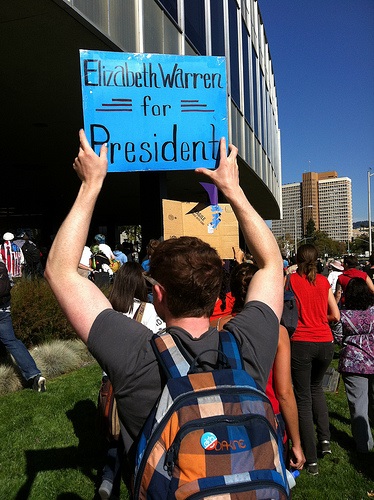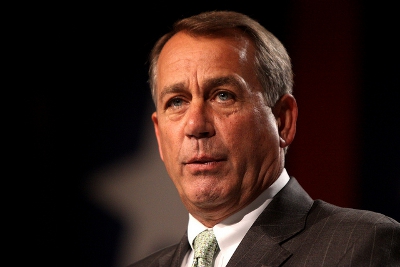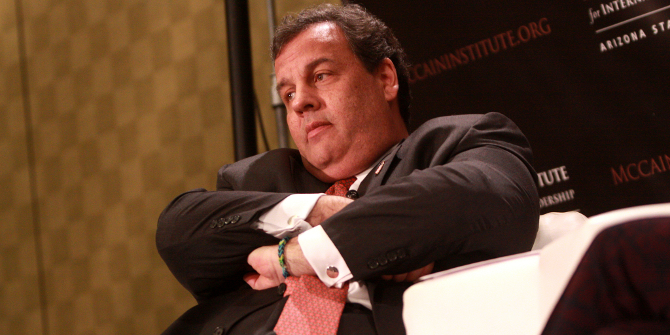USApp Managing Editor, Chris Gilson looks at the best in political blogging from around the Beltway. Our round-up of state blogs will follow on Saturday afternoon.
President Obama, the Democratic Party, the GOP and elections
This week saw continuing speculation over if – and when – President Obama is likely to announce that he will be taking executive action to deal with immigration issues, in light of Congressional inaction on the matter. On Saturday, The Daily Signal writes on what they say is the President’s ‘divisive course on immigration’. They say that Obama has been increasingly pushing his amnesty agenda without Congress by loosening up enforcement, and is now planning a broader amnesty that could include millions. On Sunday, Outside the Beltway reports that the Obama Administration has signaled that the President may wait until after the summer to take any action on immigration issues. They write that Obama may be considering deferring action which might provide temporary relief to the families of those who have legal status until after the November midterm elections, in an attempt to keep the Senate, which is looking like it may be taken over by the Republicans according to recent polling.
Many have criticized the leadership and rhetorical style of the President – on Wednesday, The American Prospect takes a close look at his limitations in these areas. They say that while Obama impressed people with his words on hope and optimism when he ran for President in 2008, he does not channel emotions like anger and fear well, and that this means he is having a harder time in rallying the public behind him compared to presidents such as his predecessor George W. Bush, who can ‘whip people into a frenzy’. Another criticism often levelled at the President is that he is ‘checked out’, and treats the growing threat of the Islamic State in Iraq as an ‘abstraction’. RedState argues that he has not himself checked out, but rather has checked the United States out of international affairs because of he thinks that the world would be better ‘if the American imperial aggressor would just sit on the sidelines’.

Moving to two potential Democratic candidates for the presidency in 2016, Hit & Run looks at former Secretary of State, Hillary Clinton’s ‘millennial problem’. They say that recent polls show that millennials are less partisan than older voters, and that they are getting tired of both parties, with 34 percent of 18-29 year olds calling themselves true independents. Meanwhile, National Journal writes that another possible presidential contender, Senator Elizabeth Warren (D-MA), has given the GOP a gift in an interview this week by stating that she was concerned about government’s relationship and ‘coziness’ with Wall Street. This was interpreted by the GOP to be a critique of Hillary Clinton’s close relationship with Wall Street.
Turning to potential presidential candidates from the Republican Party, PoliticusUSA writes that a recent poll that shows that 35 percent of the likely GOP Iowa caucus voters would vote for past Republican presidential candidate, Mitt Romney. They say that the poll is likely to add fuel to the fire of those who are calling for him to be candidate again in 2016, especially since his polling numbers are higher than the other GOP front-runners. On Tuesday, Hit & Run looks at whether or not Senator Rand Paul (R-KY) will have to risk his Senate seat if he wishes to run for President in 2016. They say that people in Kentucky are split over the idea of him running for President and the Senate at the same time, if he wants to remain a Senator if his presidential bid fails. Kentucky state law currently forbids candidates running for both offices – something Paul has been working to change. On Thursday, Crooks & Liars also looks at Senator Paul, saying that he has flipped from being a ‘non-interventionist’ in international affairs to now calling for the U.S. to destroy the Islamic State in Iraq, militarily. Florida Senator, MarcoRubio is another rising star in the Republican Party that has been tipped to have Presidential ambitions for 2016. National Journal has a look at Rubio’s political trajectory, and argues that while his political acumen is very good, if he does run for President, then he will have to prove he is more of a statesman than a strategist.
With the midterm elections looming in early November and summer drawing to a close, commentary and speculation continued over various key Congressional and Gubernatorial races. Louisiana Senator, Democrat Mary Landrieu has come under fire from conservatives for owning a home in Washington DC, with some suggesting she is not committed enough to the state. The American Prospect says that these accusations are ‘stupid’, and reflect the idea that many conservatives hold that Washington is a ‘horrible’ place that Representatives should not engage closely with. Meanwhile, The Atlantic looks at how Governors’ races across the country are turning the national political map upside down, as Republicans look to make inroads in traditionally blue states like Hawaii, and Democrats are upbeat about winning in Kansas.
On Monday, Daily Kos writes that this year’s election is not like 2010. They say that the last midterm election saw Democratic polling slide in the months leading up to the ballot – something that is not in evidence this time around. National Journal echoes this sentiment, writing that this year is unlikely to see a Republican wave, though the Democrats may still lose control of the Senate. Meanwhile, RedState wonders if the African-American vote is likely to save troubled Democratic Senate incumbents. They are very skeptical given President Barack Obama’s declining popularity in key Senate races. PoliticusUSA is not so negative, writing on Tuesday that the GOP is being outspent on House races, and may only gain five extra seats. On Thursday, Hit & Run says that developments in Kansas this week may mean that one Independent candidate may determine control of the Senate. They say that after the Democratic candidate in Kansas, Chad Taylor, withdrew from the race this week, incumbent Senator Pat Roberts now faces Independent Greg Orman, who may attract Tea Party Republicans disaffected with Republicans.
Government, the Beltway and Congress’ agenda
On Wednesday, Roll Call reports that a new ‘funding Band-Aid’ to manage the border crisis means that the Department of Homeland Security will shift $400 million in funding from other programs. They say that Secretary Jeh Johnson has stated that the move was needed as Congress has not been able to agree on emergency funding to cope with the surge in child migrants at the Southwestern border.

This week, The Daily Signal reports that House Republicans have been working on a deal to extend the life of the controversial Export-Import Bank, whose charter expires on September 30th. The bank, which provides guaranteed loans and support to overseas buyers of American products, has come under fire from conservatives for being a waste of money. Meanwhile, PoliticusUSA writes that Republican House Speaker John Boehner is planning on spending most of September ‘shaming Democrats’. They write that Boehner will not use the short legislative session this month to try and pass any legislation, but will be attacking Democrats for their failure to go along with the GOP’s Tea Party driven House agenda. The Atlantic writes in a similar vein, saying that Congress is unlikely to get anything done this fall, given that they only have six full and six partial days of work between now and the November election. What it does have to do, is pass a Continuing Resolution for the budget by midnight on September 30th.
On Thursday, United Liberty writes that as the situation in Iraq continues; only Congress can approve a stronger response in the form of military action. They say that Representative Frank Wolf (R-VA) is planning to introduce legislation next week that would authorize the use of force against the Islamic State and other terrorist organizations.
Daily Kos writes this week bemoaning the rise of money in politics after recent Supreme Court rulings – saying that political donations are being used to buy time with politicians like Senator Ted Cruz (R-TX) and Texas Governor Rick Perry.
Foreign policy, defense and trade
Late last week, President Obama admitted in a press conference that “We don’t have a strategy yet”, in dealing with the Islamic State in Iraq and Syria. On Tuesday, RedState takes issue with the statement, writing that Obama does have a strategy: “apologize for America, appease the radical Muslim world, and ignore the threat posed by jihad”. They say that he’s been willfully ignoring the threat posed by the Islamic State, and that he must change his strategy, before it’s too late. Meanwhile, the White House Dossier is critical of the Obama Administration’s ‘incrementalism’, after it announced it was sending 350 extra military personnel to Iraq to protect diplomatic facilities and personnel.
United Liberty is less hawkish, writing this week that the U.S. should be cautious about the prospect of military intervention in Iraq and elsewhere, and that it should only take action if American interests are directly threatened. Meanwhile, The Feed wonders if the ‘sleeping giant’ – American public opinion on intervention – is beginning to stir, after a new poll has shown that more people saying the country does too much to address global problems has fallen from 59 to 31 percent.
Obamacare and health policy
On Sunday, National Review’s The Agenda writes that a new report from the Congressional Budget Office on Medicare has shown that while Medicare spending is expected to rise to 3.2 percent of GDP in 2024, but as the economy picks back up and the population ages, more pressure will be put on the program, which is facing $28.1 trillion in unfunded liabilities over the next 75 years. Wonkblog looks at a similar issue, writing this week that the historic slowdown in healthcare spending is coming to an end. They say that as Obamacare expands coverage and Baby Boomers join Medicare, health spending will grow on average by 5.7 percent each year through 2023, more than 1.1 percent more than GDP’s expected annual growth.
Moving to Medicaid, Daily Kos writes that the states that have refused the expansion of the program under Obamacare will send $152 billion in taxes over the next decade to fund the states that did expand coverage. They say that these states are missing out on $170 billion in just hospital payments, at the same time as those hospitals have to absorb cuts.

On Tuesday this week, Hit & Run writes on more new signs that enrollment in the Obamacare Exchanges is falling. They say that in June in Florida, enrollment in private plans through federally run exchanges was lower by 220,000 than the total reported by the administration at the end of open enrollment. They also say that large insurers are also reporting that up to 30 percent of those that signed up for plans have not translated into paying customers. On Wednesday, The Daily Signal writes on the ’18 new or increased taxes and fees’ that were introduced under Obamacare that will bring in nearly $800 billion in new revenue by 2022. They say that the annual fee levied on health insurance providers based on each company’s share of the total market has garnered attention this week because it is being assessed on the federal and state governments, with taxpayers footing the bill.
In July a judge ruled that health insurance plans offered by federally operated health insurance exchanges in states that do not offer their own exchanges would not be eligible for subsidies. Crooks & Liars reports that the case will now be reheard by the full Washington DC circuit court, invalidating the previous judgment.
The economy and society
On Sunday, PoliticusUSA reports that a United Nations human rights report has criticised the U.S. for its record of racial and ethnic discrimination. They say that the UN Committee on the Elimination of Racial Discrimination has called on the U.S. to halt its excessive use of police force, in the wake of the shooting of Michael Brown in Ferguson, Missouri in August.
Ahead of Labor Day on Monday, Hit & Run argued against increases to the minimum wage, as currently being instituted by many states and cities across the country. They say that while minimum wage increases are sold as an easy way to increase the incomes of the working poor, the fact that only 3 percent of all workers earn it, and often for a very short period of time, mean that they are a poor way of bringing people out of poverty due to the way that they distort labor markets. This week also saw fast-food workers protest across the country, calling for higher wages. The Daily Signal writes that if the minimum wage were raised to $15 an hour, then fast-food prices would rise by 38 percent, and restaurants would see profits fall by 77 percent. Still on the topic of employment, Wonkblog writes on Wednesday that the Organization for Economic Cooperation and Development has stated this week that they predict that the U.S. unemployment rate will soon be at 5.9 percent, lower than their 34-country average.
This week, the Seventh Circuit Court of Appeals ruled that same-sex marriage bans in Wisconsin and Indiana were unconstitutional, writes Daily Kos. They say that the Wisconsin attorney general plans to appeal the decision straight to the Supreme Court.
And finally…
Daily Kos looks at the best and worst campaign ads (so far) of this year’s election season.
The Monkey Cage examines whether or not Republican leaders are more prone to believing in conspiracy theories. The answer? Probably not, according to the (limited) evidence.
The Daily Signal reports that new state regulations designed to prohibit the supplementary feeding of wild animals in Mississippi have accidentally made bird feeders illegal.
Featured image credit: MudflapDC (CC-BY-NC-SA-2.0)
Please read our comments policy before commenting.
Note: This article gives the views of the author, and not the position of USApp– American Politics and Policy, nor of the London School of Economics.
Shortened URL for this post: http://bit.ly/1wbBHhv





